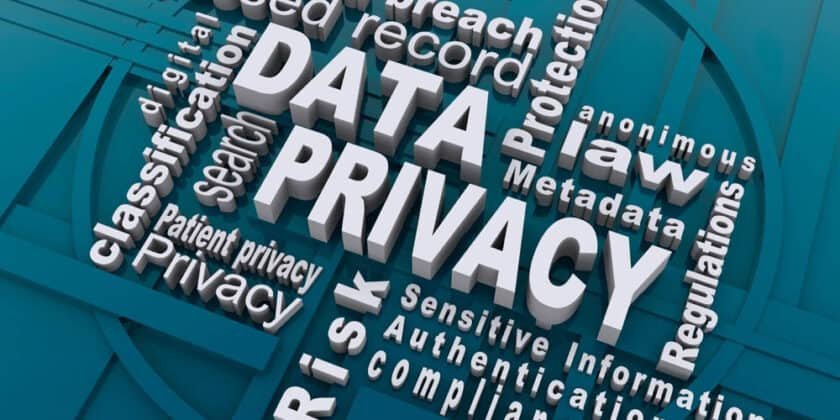A breach of business privacy can have a catastrophic impact, including the loss of customers’ trust, harsh fines from your e-commerce platforms like Google and Pinterest, and the deletion of content from your content management system. You can suddenly stop appearing in people’s searches after having the most reliable website in your industry. Imagine that all the time and effort you put into creating pillar pages and topic clusters for your blog was in vain due to cyber criminals.
You need to be vigilant about more than just financial data, government ID numbers, and medical records since hackers are lured to simple targets. As a result, one of the best ways to keep your business safe from cybercriminals is to have a cdp customer data platforms privacy policy and follow it.
Top 11 Business Privacy Tips For Customer Data:
Numerous recommendations to keep your customer’s data private:
1. Gather only the most pertinent data
Make sure to specify in your policy that you will only keep the bare minimum of customer information. If you’re not going to use the details, don’t ask for them. Companies frequently experience security lapses. As a result, it’s important to differentiate between the data you must keep (such as names and addresses) and the information you may safely ignore.
Having information that allows a third party to process credit card payments is frequently a safer alternative for business privacy policy url. Many people now rely on services like PayPal, Stripe, and Square for online payment. For the protection of any sensitive data, they give top priority to the installation of thorough security procedures.
Source:
The forms on your website may provide a wealth of information, so you should carefully consider it all. These kinds of forms can be seen on websites such as landing pages, newsletter registration pages, and account setup pages.
Let’s say for the sake of argument that you have experience operating an online bookstore business. You’ve noticed that you rarely get in touch with customers on their mobile devices small business privacy policy template. All of your things are digital, so there’s no need to give the couriers your phone number. Collecting this information would be worthless in this case.
Database segmentation will have a significant positive impact on your email marketing operations. The things they’ve bought, the dates they’ve contacted, and their place in the sales funnel can all be used to categorize your customers in different ways. If you use data on customers’ purchases and browsing behaviors to create unique groups of them, you can limit the amount of personally identifiable information you collect from them.
2. On a consistent basis, Check the info you’re keeping on hand
Do you ever review API settings, log details, databases, etc. to ensure what information is being collected and stored? An important business is the company database. Because so many people may have access to the data, regular audits are required. Conducting an audit can allow you to determine whether the right procedures were followed while handling sensitive customer data management.
In addition, users can meet the requirements of the many laws governing the processing of personal information by keeping track of who has access to the data, when, and any changes made.
To put it another way, an audit of a company’s databases is a method of determining how well the company guarantees the privacy of its customers’ databases. This is essential since the relevant rules and regulations frequently change quickly.
If you are utilizing Windows business privacy laws, you can utilize Microsoft SQL Server to keep an eye on database system activity. Microsoft created a tool called SQL Server Audit that tracks database information by looking into transaction logs and keeping track of when and how data and objects have been modified. DBAs can investigate any unexpected database behavior with this tool. It makes it easy to do audits at several levels, including those at the server and database levels.
3. Be open and honest about your privacy practices
Essential to business privacy is a current, genuine privacy policy that complies with laws in both your own country and any other countries where your company conducts business. It should be simple to find the website’s policy. The footer of the website, along with other legal disclaimers and contact information, is a usual position for this policy. Look at this screenshot I grabbed of ConcreteCMS.com’s footer, where a link to their privacy statement is located:
Several businesses have “legal” and “common language” sections (or even several versions) of their strategy to fulfill the requirements of new privacy regulations and ensure that their policy is understandable. At https://www.nytimes.com/interactive/2019/06/12/opinion/facebook-google-privacy-policies.html, you may read an excellent article about how Privacy Policies have become more complicated to understand. The behaviors by which information is collected and used by your company online, as well as the choices that customers have, must be described in detail in your company’s privacy policy. Explain to customers how their information is protected, and stored, and who has access to it, among other things. Put forth as much information as you can.
An extra set of topics that should be included in a privacy policy are as follows:
- Whom should you inform of the information?
- Who do you work with in terms of data security?
- The Resources You Use
- How secure the encryption is
- What kind of hard disc or cloud is being utilized?
- procedures in place if your company experiences a security breach
Give your customers a chance to express their concerns if they have any about the way you are treating their personal information. In many nations, you are required to delete any related data in response to a customer’s request for deletion. Make it known that they can contact the company with any inquiries or grievances.
4. Be aware of the data of the information you are collecting and store it in a secure location in business privacy
This makes sense. But in this case, the maxim is true: common wisdom ought to be read by a wider audience. If you have no idea what something is or where it is hidden, you cannot protect it. First of all, if you had no idea where it came from or whose it was, it would be difficult to return someone else’s lost stuff. The decision of which data regulations your company must follow will depend on whether it is aware of the sources of its data.
Don’t keep track of the random memorabilia you’ve kept for years. Does your company need permission from higher-ups before collecting more data? If so, is it known to everyone in the company? Does the “approval process” require the keeping of records? Data backups are handled in what ways?
Which “external parties” are there? What about the simple SaaS items that a member of your company purchased using a credit card (either knowing or unknowing to your IT department)? Is the information you sent them recorded somewhere? How do constraints on data transfers take place? Do you have or deliver to clients customer data spreadsheets that can be read in several places?
By Using Secure By Design, you can safeguard people’s privacy
Evaluating potential privacy concerns should be a frequent part of the development of your system or product. To ensure the potential consequences on users’ privacy, a PIA should be carried out anytime a new system or product is built, upgraded, or discontinued. To keep the information secure, it must outline the most recent security rules that must be followed. What kinds of data it can store must be determined. Your PIA needs to include a statement about the largest permitted data set. They should disclose if new data access controls are necessary.
Include a person with knowledge of the contracts and Data Processing Addendums your business has signed with its customers to examine the PIA. Have you promised that a client’s information will only be used inside a specific region? Have you promised a client you’ll always get their permission before hiring a subcontractor? If the improved system, product, or service subjects your company to any additional regulations, you should follow that up in your PIA.
5. Encrypt stored and transmitted data
When you encrypt information, you make it so that only the right password can read it. Plain text is converted into an unreadable format using sophisticated algorithms in encryption software for customer data. Anyone who wants to read the encrypted communication must enter a password.
Only 22% of SMBs encrypt their data when it is at rest. Attackers are less likely to aim for encrypted data. Unexpectedly, this finding exists. You can use encryption to store data on your computer, server, and network. One can encrypt everything, from a single file to an entire hard disc, a USB flash drive, or even data stored in the cloud. On the majority of devices, an administrator can rapidly configure encryption and set a password.
Explaination:
Data encryption at the point of collection is just as important as confidentiality while the data is at rest in a database. To create HTTPS certificates for your website, use services like Let’s Encrypt. Using the internet communication protocol HTTPS, data exchanged between the user’s device and the website is encrypted and protected.
Is your business’ cryptography policy evaluated annually to make sure it complies with best practices? Do your certifications’ key sizes exceed or match 2048 bits? DOES YOUR BUSINESS USE A VULNERABLE PROTOCOL OR IS ALL DATA RENTED USING TLS 1.2 OR HIGHER? Are the cost factors in your password hashing algorithms high enough to fend off recent attacks? Use keys longer than 256 bits in your ciphers.
Addition:
Properly encrypt the data you’re sending to protect your customers’ private information. Any financial data protection requires stored and trustworthy hosting information. You have the option of hosting the news on your servers or those of your payment processor.
Email encryption makes it harder for hackers to read private messages. Several Gmail extensions, including FlowCrypt Gmail Encryption and DocuSign, provide additional encryption for emails sent and received as well as for attachments. Even though the majority of email service providers encrypt user data by default, using additional security measures is always a good idea. Keep in mind that even if someone were to steal or misplace your data, they wouldn’t be able to read it if it were encrypted.
6. Never keep business privacy improving your software
Please ensure that all of the devices belonging to your staff and independent contractors are current. Ensure that all of your devices are running the most recent software as a simple approach to protecting your business’s network from assaults. Your company is protected by keeping your devices secure.
Hackers are constantly coming up with new ways to steal data. To address newly discovered dangers. software developers routinely make updates. These updates patch security holes in the software. Your data is protected from spies thanks to security weaknesses in the software.
Business owners frequently delay updates when things are quiet. That is a terrible idea. Because you neglected to update or put off doing so for too long, it’s dangerous to put your business at risk of losing sensitive information.
Make it a habit to update your software frequently. Every business will do this, making it a routine. Inform your staff of the importance of keeping their software current. Your company’s safety is improved by the efforts of its employees. Even better, centrally manage the devices at your company and provide updates to them.
Be sure to keep your servers regularly business privacy:
You must utilize the most recent updates and subscribe to services like US-Cert to protect your business from software defects and exploits. However, things are more complicated than that. Many people rely on their cloud or SaaS solution provider to keep them up to date. As your IaaS, PaaS, and/or SaaS provider, make sure you completely understand your role as well as theirs. Determine in detail which information requires your undivided attention.
7. Limit of Data Access
When fewer people have access to data, it is easier to access. The breadth of data access should be established in your data policy’s privacy provisions, or other words, this is the “Principle of Least Privilege.”
Limiting access to your client’s confidential information will protect it. We strongly advise conducting regular access evaluations. A process must be followed to add a new data collection system to a systems list and complete the access by role form. Who will control the system and have access to the settings for Access by Role?
8. Educate Your team in business privacy
Employees with access to sensitive data should receive training on how to handle it. They need to be aware of any threats. If your team is collecting data, make sure they understand the difference between anonymization and pseudonymization.
The company’s policy on protecting the privacy of customers’ personal information should be known to all of its employees. Teach your employees how to handle confidential information expertly. Have clear rules that they may carefully follow to ensure that the data is not exposed.
Teach your staff how to identify phishing emails and how to keep critical information secure. Businesses must regularly update their employees on the newest cyber security measures because hackers are constantly finding new ways to break into their systems.
9. Regularly examine your data systems in business privacy
Keep data security tests running at least once or twice a year if you’re concerned about the safety of the data your company stores. If you run an internet business, hackers will attack it. Trade-related sensitive information is used as bait.
If you want to securely protect your online store, you might want to think about pen testing. Finding your system’s weaknesses is made easier by penetration testing. The testing, which can identify design, mobile payment, and integration concerns specific to the website, focuses on e-commerce functional modules.
If you don’t remember the flaws in your business, someone else will, which is the most important lesson to learn going forward from this point. Fixing the issues you find makes perfect sense.
10. Protect mobile devices from potential security threats
A user has more freedom when using a mobile device, such as a smartphone, tablet, or laptop. They can expose the source to fresh risks. Your company or its customers could suffer if a third party were to access information on a missing mobile device.
Stress the value of keeping mobile devices secure among your employees to protect the privacy of your customer data. For the company to react and put data in place to ensure a data breach, make sure everyone is aware of how important it is to report a theft or loss as soon as possible.
Have rules for which company systems/services particular mobile devices are allowed to connect to to prevent mobile devices from being compromised while applying controls. Typical actions include:
- need a connection to a virtual private network (VPN).
- To reach production, use public key infrastructure (PKI) encryption.
- use a Yubikey-style multi-factor authenticator (MFA) that isn’t connected to a mobile device.
- restricting what is allowed on a device using a tool.
11. Keep your customers informed about any customer data policy modifications
In general, consumers are unwilling to provide brands with personally identifiable information. You must figure out what will happen to the data, which is the biggest problem. It’s important to keep customers informed about any updates to your company’s policy involving their personal information.
Privacy rules frequently require you to explain how you intend to use customers’ information. It’s possible that couriers who offer VoIP phone services must share the contact information of their customers. Therefore, if you’re changing your courier service, be careful to inform your customers and detail how the change will affect how their data is handled.
When talking with clients about how you handle their emails, keep your data and social media postings succinct, avoid using buzzwords and sales pitches, and stick to the point. Instead of marketing a product, the message’s objective in this case is information distribution.
For instance, the company issued the following email when Panasonic amended its privacy policy:
Source:
Ensure that you consistently keep your customers informed about data consumption. You must be open and transparent if you want to earn your client’s trust.
Business privacy in summary:
It can only lead to positive results if you manage customer data privacy appropriately for your business privacy. Customers want their information to be handled carefully and used only for the purpose for which they entrusted it to you, even if there is no clear law requiring it to be handled in a certain way.
Your business should perform the following to protect the privacy of your data information.
- removing only the most important details.
- I have a reliable policy on user privacy.
- Inform your customers frequently.
- Limit access restrictions and conduct frequent checks of the database.
- By encrypting it, you can keep important information private.
- Keep the software up to date regularly.
- Data system testing should be done frequently because it is important.
In case of loss or theft of a device, ensure that you prevent security concerns with mobile devices.
Customers place their trust in you when they give their information to you, so it’s important to keep yourself, your employees, and your customers aware of this. Ensure that the data doesn’t end up in the wrong hands by making every effort.







